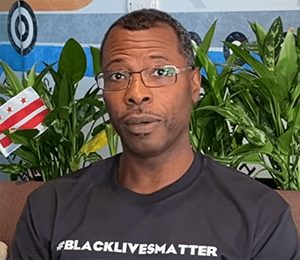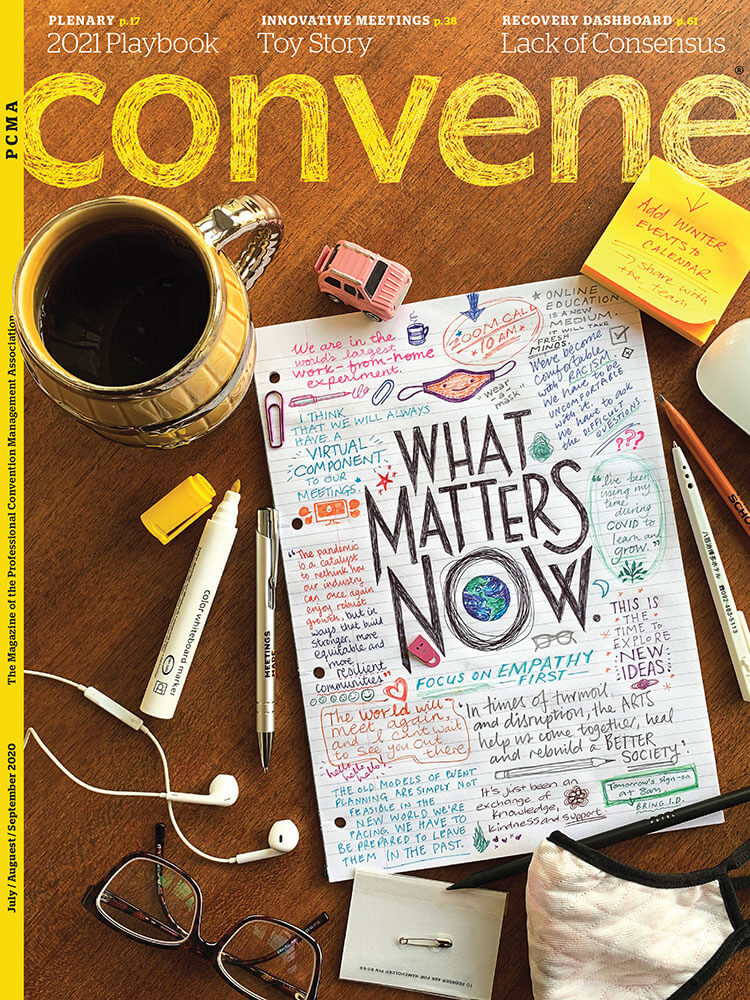Before the killing of George Floyd by police officers in Minneapolis, “it was almost off limits to talk about race — at least in our industry in tourism,” said Melvin Tennant, CAE, president and CEO of Meet Minneapolis. But the brutality of the May 25 killing produced an outpouring of national and global protests, and an ongoing public reckoning with the effects of racism under the banner of Black Lives Matter.

Elliott Ferguson as seen in the video
In July, seven Black executives from U.S. destination marketing associations, including Tennant, spoke candidly in a video, “5 Questions About Race,” about their own personal and professional experiences. The video was produced by Destination DC in partnership with Louisville Tourism, Visit Baltimore, Travel Portland, Meet Minneapolis, and Experience Columbus. It premiered July 14 at Destinations International’s 2020 Annual Convention, held online.
According to data collected by The Washington Post, Black Americans are killed by police at more than twice the rate of white Americans. The video presents the issue from the perspective of Black males, because since 2015, 96 percent of Black Americans killed by the police have been male. At eight minutes and 38 seconds long, the video “takes less time to view,” points out a Destination DC press release about the video, “than the eight minutes and 46 seconds that George Floyd had a knee on his neck when he was murdered on May 25, 2020.”
“There are a few reactions as this public conversation continues: Some people are concerned; some don’t know what to say; some are scared; and some, unfortunately, will remain ignorant,” said Elliott L. Ferguson, II, president and CEO, Destination DC, in the release. “But these are discussions we need to have and then follow them with action if we are to effect real change in our country.”
“As Black destination leaders for a majority African-American city, we make a special call to our white colleagues to help us confront racism,” said Visit Baltimore President Al Hutchinson and CEO Charles H. Jeffers, II, CDME, in a joint statement. “We can’t do this alone; we’ll only achieve positive, lasting change by working together.”
Following are the five questions that the video explored, along with responses from tourism executives:
How is it different growing up Black in America?
“You must be 10 times better than white people in school, sports, or as a professional, to receive the same equal treatment.” — Cleo Battle, CTA, Chief Operating Office, Louisville Tourism
Have you experienced racism as a Black professional in the tourism Industry?
“He comes over to me — I’m new to town as a senior leader of tourism — and he says to me: ‘Al, if you ever think about hiring this lady, I have friends that have white hoods. I just wanted you to know that.’ And he just walked away.” — Al Hutchinson
How has the murder of George Floyd affected you?
“It hurt me to the core when George Floyd was murdered, and not just because it was in my city, but because it [has] happened over and over again.” — Melvin Tennant
“And then we see the tragic happening of George Floyd lying in the street — in addition to Ahmaud Arbery, in addition to Breonna Taylor. It just began to be a little too much.” — James Jessie, chief sales officer, Travel Portland
How have recent events changed how you work with others in our industry?
“What’s happening in America today has allowed me to have open and honest conversations with my white friends and colleagues.” — Charles H. Jeffers, II
What would you tell non-Black tourism professionals who want to support the inclusion of Black people?
“Black people are tired, and we’re at the brink. And we just need to be able to express ourselves and we want people that are non-Black to just listen, and have that understanding… . We’ve become comfort- able with racism. We have to be uncomfortable with it. We have to be able to ask the difficult questions.” — Dan Williams, Vice President, Convention Sales and Services, Visit Columbus
“Listen with your ears, but also listen with your mind and with your heart — because until we have changed minds and changed hearts, this will just be a moment and not a movement… . These conversations are important if there is ever going to be true racial reconciliation.” — Charles H. Jeffers, II
“When you’re at work, when you’re in the board room, when you’re in the committee room, look around those rooms for Black people in those crowds and ask what their perspectives are. If you look around and don’t see any Black people, that’s when you can become our advocate.” — James Jessie
Barbara Palmer is deputy editor at Convene.
Earn CMP Credits
This story is part of Convene‘s September CMP Series package on ways the world has changed since COVID-19 and what we hope will stick once the pandemic is behind us.
Earn one clock hour of certification credit by visiting the CMP Series page to answer questions about information contained in this article and in “How Different Personality Types Cope With an Always-on Culture,” a Harvard Business School article on how to combat the “always-on” workplace expectation that may be exacerbated by working remotely during COVID-19.
The Certified Meeting Professional (CMP) is a registered trademark of the Events Industry Council.

